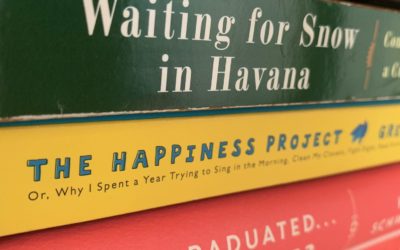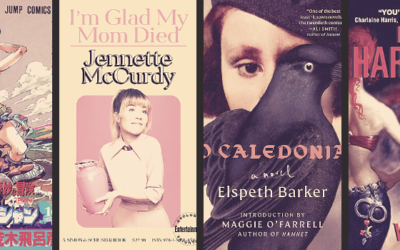Recently, I’ve been taking part in not only some book clubs, but also buddy reads! Emma from Words and Peace and I are currently reading The Andromeda Strain by Michael Crichton. We’re currently at Day 3 out of 5 in this book, and so far it’s been a very interesting story that combines a fictional narrative with lots of consideration towards scientific accuracy. In case you missed any, here are our previous discussions:

The Questions (Spoilers Ahead!)
1. What was your reaction to rule 48 / all scientists are blind?
Emma: The story about the error around the chromosome number is actually true. The first observer counted 48, and it took 30 years for someone else to check and realized, no, it was 46.
Unfortunately, it has happened that some scientists have managed to prove something incorrectly, because they were just too sure they would find something that was actually not there. And sometimes, when you read different studies about the current Covid-19, you may wonder if this is still at play alas in some milieus.
But I trust that most scientists are not that blind and work with less bias. It is actually easier said than done. By nature, we rely on what we already know or imagine, and it can be really hard to study something like you would walk into complete terra incognita, and then really see what it’s there to see. And this applies to many spheres, not just the scientific domain.
Julie Anna: I’ve heard about the chromosome error before, but it’s definitely something I’d like to read and learn more about.
I trust the intention of scientists as well, and while I’m not one myself, going through research papers and scientific journals I see the lengths that they go to determine how strong their studies are, and where their work could be improved. I agree – I think it depends more on what resources they may have and knowing how to best organize and execute their studies rather than any sort of bias going in.
2. Knowing the mentions of Soviet intervention that took place, do you still have any feelings towards this book being more contemporary?
Emma: No, it has a clearer Cold War feel to me, but still, I am impressed by how more modern some inventions seem.
Julie Anna: Same here – I don’t feel like this was intended to be a timeless work anymore, but sometimes it feels that way when it comes to some of the cultural depictions. For example, when they searched Piedmont there weren’t any descriptors that indicated a particular time period. In the end, I do feel more settled on the fact that this was meant to be a Cold War-era story based on what we’ve seen now.
3. What do you think of the technologies that are used to study the virus? Are there any technologies or studies you’ve come across while reading this that you didn’t know existed at that time or weren’t expecting?
Emma: Indeed, I had to check a few things. Did these things actually already exist at the time or not?
I didn’t know for instance that gloveboxes already existed in the 1950s.
I was shocked to realize fiber optics started to be developed in the 1950s, including for data transmission in the 1960s!
There are a few things in medicine that I don’t think existed, and we have been talking about these a lot recently, with the development of telemedicine, like what he calls “the medical-data analyzer”.
I don’t know if there were already so many satellites out there when the book was written, but I know the current situation is pretty bad. I actually recently read an article showing how we have trashed space, and how this is becoming dangerous for flights, with so much debris. Even if they are tiny, with speed they could easily damage spaceships. We are working on solutions to get rid of all this space junk.
Julie Anna: I found myself looking up quite a few things as well! What intrigued me the most was the introduction of touch-screen monitors. Apparently, this was something that was implemented for use in the early 1970s. I had no idea that technology like this existed this early, but I suppose a lot of technology like this existed for quite some time in these settings before they were introduced with the home computer.
The medical data analyzer was interesting! Algorithm-wise, it’s probably not that crazy of a program for modern times – I think what it would be doing is matching the input of symptoms against a map of symptoms linked to a condition and returning the most likely one. But that would be a TON of data to sift through, especially knowing how much physical space mere megabytes took in that time. I’d love to see if we had anything similar in that time and look at how it was set up – it’s incredible what we accomplished with so little memory!
I saw a visualization of just how much space junk/satellites are out there – it’s hard to believe! I’m not sure how many satellites we had out there at the time this book was written, but it’s startling just how much we’ve put in space over the last 50 years.
4. We learned a little more about Mr. Jackson’s life in Piedmont in this section. Do you think that we’ll get any more information on the lives of the characters in this book, or do you think that they solely will exist to progress the story? Do you want to learn more about the characters?
Emma: I usually like to learn more about characters, but with this genre and book, I wouldn’t mind if we didn’t know more about them. For me, it’s like their whole life is focused on their mission, their whole life IS their mission. Unless what they experienced before or their character could have a major impact on that mission. And maybe we’ll learn more to explain why Jeremy was losing his focus and made these mistakes.
Julie Anna: I’m the same way – typically, character development is really important to me. But with this book, I really don’t mind not getting to know them as much. I think getting into their character (and especially their emotional responses) would genre-bend this a bit more towards horror. And while I personally don’t mind that, I think it would end up being a little bit too much going on in this book. I like how the focus is more on the process and what would happen in this situation, coupled with scientific explanations that justify the story.
5. Do you have any theories as to how Mr. Jackson and the baby survived?
Emma: Alas, I’m not science-savvy enough to guess that! What do YOU think?
There seems to be some connection with the polymer found in the plane that crashed. They say “it has some of the same characteristics as human tissue”. So could it be related to some type of cells only present in human adults? Not yet developed in a baby, and dead in the elderly?
And alas, I can’t figure out what the scientist missed. What’s the connection with the birds? And with what happened to the Scoop when it got out of orbit? Why was it deleted from the files?
Julie Anna: I’m not sure myself, but I like your theory! I’m unsure about Mr. Jackson, but I was wondering if, with the speed that this thing spread, if the family died before it had a chance to get to the baby. But with the highly contagious nature of this…I’m not so sure! I like your theory much better.
I thought the concern with the birds was that they could carry it to surrounding areas – perhaps they have something in their genetics that keeps them alive and are able to transmit it easily? I really want to know the answers to these soon!
6. What did you think about the President’s decision not to call a directive 7-12, and the response that the President “doesn’t trust scientists?”
Emma: Ah, very hot topic these days, between political and scientific responsibilities! You would expect they would work together, but they don’t always, some recent presidency has been here to prove it.
In the context of the book, the President’s hesitancy to follow the scientific advice and call a directive 7-12 might be justified by all the international consequences such a decision would have had?
I actually don’t know what prompts the author to say “The President doesn’t trust scientists.” I had the feeling that scientists were almost revered by politicians during the Cold War. How do you explain that line?
Julie Anna: Ah, I haven’t thought about their relationship during the Cold War! I suppose there would have been international tension caused by that decision. It had reminded me of more modern examples of relationships between scientists/engineers and decision-makers (the Challenger disaster is one that comes to mind). Their response felt a bit ominous to me, and almost foreshadowing in a sense that they knew that things could get really bad really fast without his approval.
Emma also had some additional comments for this part:
Emma: I liked the passage with the three possible sources of extraterrestrial bacteria, including the possibility that some Earth bacteria would have gone into space, then got transformed and came back to Earth completely evolved and different. I don’t know if it’s crazy or scientifically plausible, but I like the idea, at least as far as creativity is concerned!
The section on the late development of biology studies was very good too.
I thought the author showed some pessimistic view of man – the violence I understand, but this whole thing about the human brain, I’m not sure I would agree with this:
“Certainly they [rats] did not have the intelligence to destroy themselves; that was a peculiar invention of man.
He often argued that human intelligence was more trouble than it was worth. It was more destructive than creative, more confusing than revealing, more discouraging than satisfying, more spiteful than charitable.
…Perhaps the human brain had become a kind of dinosaur for man and perhaps, in the end, would prove his downfall.
Already, the brain consumed one quarter of the body’s blood supply.”
Incidentally, it’s amazing we are reading this book right now, when the US government is in the process of releasing documents admitting to UAPs (Unidentified Aerial Phenomena).
Julie Anna: The bacteria theories were interesting! The idea of the bacteria being transformed reminded me quite of a bit of how we often transmit viruses to and from different animals and how they evolve in that process. I’m curious to know how that would work in space and if that theory will be explored more as we have some more of our questions answered.
That passage regarding the rats made me think of our environmental impact in particular, and the damage humankind has done to the planet. I wonder if this was a reflection of human nature to say that we’ve gone too far, too fast in our achievements, and didn’t look to the future when taking care of what we’ve done.
That’s true, too! This really does feel like the most timely point to read this book.

What elements do you look for in a sci-fi story? Do you prefer to have scientific backup behind the plot of the story, or do you like to explore alternate realities regardless of the plausibility of those worlds? (For me, it’s both!) Let us know!

This Year, I Made the Goal to Read Less – Balancing Books as a Book Reviewer
It's not everyday that you hear someone say, "I want to read less" - if at all.But being fully absorbed in the book community completely transformed my reading habits - for better or for worse. While being a book reviewer brought me the consistency and routine that's...
2023 is Here: Intentions, Reflections, and Books
So uh - hey, everybody - it's been a minute. And when I say a minute, I mean two months. And within those two months I forgot to renew my site domain and this blog wasn't even accessible for the time being.Is Buuuuuut...I'm back now? If this year has taught me...
October 2022 Wrapup: Back to the Grind
Hello hello! I hope you had a good month. This October had quite a bit going on for me, in terms of work, life, and books. Let's check it out! October in General October definitely hit me hard - but not with bad things! There was so much good that happened, but it...





Thanks for your great questions.
2/ Good point about places like Piedmont that could be almost anywhere and any time, because of the lack of cultural details
3/ Yes, the space junk is really scary, and sad
4/ Fascinating remark, that if he had focused more on the characters’ reaction, we could be closer to the horror genre. I had not thought along these lines before (probably because I hardly ever read horror), it makes sense”
5/ Looks like I was close, though it was not about the skin!
6/ Great parallel with the Challenger disaster, I didn’t even think about it!
And I like your comparison with the mutation of viruses when they get through the animal chain.
I love our rich exchanges!
Yes, I’m definitely enjoying our conversations surrounding this book! There’s so many interesting topics that are coming from this book.
The bit about scientific bias is interesting- i do think scientists by and large try for accuracy but like anything else, some bias and errors are going to creep in. It is fascinating too to see how many technologies were actually around, and we don’t always realize it because they hadn’t been popularized/ in widespread use yet.
The UAP connection has me curious too.
Yeah, this is something that I found really interesting too! I know in research papers researchers will do everything they can to point out flaws in their research as it does happen. It is amazing what we had around in that time; I previously assumed that we didn’t have these things until they were released with the personal computer, but in reality, these things existed for a long time beforehand!